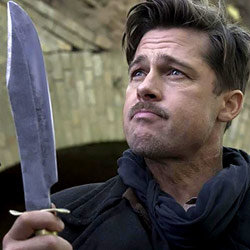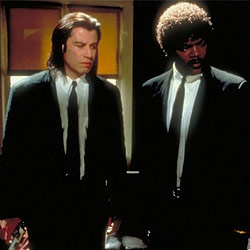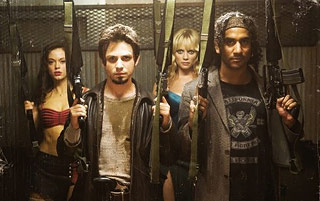One of the most recognizable pop cultural icons of his generation, Quentin Tarantino has established himself as a true film auteur with a respected philosophy that places the finished project high above the paycheck. Quoted, mocked and copied to death by almost every media outlet over the last 15 years, no one knows how to operate a Xerox machine better than Tarantino himself. Criticized for allegedly stealing from some of the best in the business, the self-proclaimed film geek certainly knows his movies and doesn’t mind paying homage to them. Heck, he’s even gone on record as saying that he “[steals]from every movie ever made.” But whether or not his actions warrant a slap on the wrist from the film gods, no one can deny his talent for creating some of the best movies of the last 20 years.

Illustration by Brian Smith. © 2007 Bullz-Eye.com, LLC
Born in 1963 in Knoxville, Tennessee, Quentin’s family moved to Los Angeles when he was only two years old. Named after Burt Reynolds’s character, Quint, in “Gunsmoke,” the future director was immersed into the Hollywood culture at a young age. But despite his intentions of becoming an actor, Quentin skipped out on film school and got a job as a clerk at the video rental store, Video Archives. Spending his days watching and chatting about movies with customers and friends (including future collaborator Roger Avary), Quentin met Lawrence Bender at a party one night and was encouraged to write a screenplay. The result was “Natural Born Killers” and “True Romance,” both of which he sold in order to finance his directorial debut, “Reservoir Dogs.” The film was an instant hit at the 1992 Sundance Film Festival and opened up a door of opportunities for the young filmmaker including offers to direct big-budget films like “Speed” and “Men in Black.”
Instead, Quentin retreated to Amsterdam to work on his next project, and two years later, “Pulp Fiction” opened to critical acclaim, earning him an Academy Award for Best Original Screenplay and the Cannes Film Festival’s highest prize, the Palme D’Or. With everyone in Hollywood now trying to mimic Tarantino’s style, critics and fans worried that the director wouldn’t be able to live up to the extraordinary expectations that his first two films had set. In 1997, Quentin released “Jackie Brown,” an adaptation of the Elmore Leonard crime novel, “Rum Punch,” and although critics ate it up, audiences booed it out of theaters. The film’s commercial failure may be to blame for Quentin’s disappearing act towards the end of the 90s and into the new millennium, but after a long break from the movie business, Quentin returned with a vengeance (quite literally) with the two-part revenge film, “Kill Bill,” that reunited him with his “Pulp Fiction” star Uma Thurman and breathed new life into both of their careers.
Those concerned that Quentin would go into hiding yet again were relieved when the director teamed up with his old friend Robert Rodriguez in 2007 to create a double-feature that paid homage to the B-movies and exploitation films that he watched as a kid. “Grindhouse” was a box office flop, but that didn’t stop Quentin from showing an extended cut of his segment, “Death Proof,” at the Cannes Film Festival later that year. He returned in 2009 to premiere his most recent project, the WWII revenge flick “Inglourious Basterds,” and though reception was mostly mixed, the film went on to become his biggest commercial success.
Though he’s yet to choose his next project, Tarantino continues to bite off more than he can chew. Along with a proposed third volume of “Kill Bill,” the director has also expressed interest in a possible sequel to “Inglourious Basterds” (expanding a subplot from his original script following a unit of African-American soldiers) and remakes of the 1966 martial arts classic “Come Drink with Me” and the Russ Meyer exploitation film, “Faster, Pussycat! Kill! Kill!” Whatever he decides, you can be sure that it’s going to brimming with memorable characters, slick dialogue and, if his last few films are any indication, some wicked action sequences as well. We wouldn’t expect anything less.
The Best of the Best
“Inglourious Basterds”
 For a movie made by one of the most identifiable directors in the business, “Inglourious Basterds” is the least Tarantino-esque of all his films. The WWII revenge fantasy is a real movie lover’s kind of movie. Not only does it feature some of Tarantino’s best writing, but it also boasts a stellar ensemble cast (including award-worthy performances from Christoph Waltz and Michael Fassbender) and some of the most thrilling sequences of the year. The German bar scene may feature Tarantino at his nostalgic best, but the opening chapter is his magnum opus. That “Inglourious Basterds” can run for an additional 120 minutes and still be just as engaging is a testament to the film’s supreme quality.
For a movie made by one of the most identifiable directors in the business, “Inglourious Basterds” is the least Tarantino-esque of all his films. The WWII revenge fantasy is a real movie lover’s kind of movie. Not only does it feature some of Tarantino’s best writing, but it also boasts a stellar ensemble cast (including award-worthy performances from Christoph Waltz and Michael Fassbender) and some of the most thrilling sequences of the year. The German bar scene may feature Tarantino at his nostalgic best, but the opening chapter is his magnum opus. That “Inglourious Basterds” can run for an additional 120 minutes and still be just as engaging is a testament to the film’s supreme quality.
“Kill Bill: Volumes One and Two”
It’s hard to stay mad at someone for taking seven years to make a movie when the end result is as good as this, but while Tarantino certainly took his good old time in releasing the two-part revenge flick, it was business as usual in what is arguably his most mainstream film to date. What’s perhaps most interesting about “Kill Bill” is how different the two volumes are from one another. While Volume One is a balls-to-the-wall action film with enough blood and severed limbs to fill several horror movies, Volume Two is more of a slow burn that spends a lot more time on The Bride’s backstory. Both films benefit from having great casts (led by Uma Thurman in one of the best roles of her career), well-choreographed fight sequences, and of course, the kind of clever dialogue that only Tarantino can deliver.
“Pulp Fiction”
 It’s a subject of discussion that’s been talked to death, but had “Pulp Fiction” been released any other year than 1994, there’s a good chance it would have walked away with a lot more than just one Academy Award. Though it’s hard to argue against the film winning for Best Original Screenplay (Tarantino’s crackling, pop culture-infused script has remained just as quotable 16 years later), Samuel L. Jackson was positively robbed of Oscar gold for his career-defining performance as fast-talking hitman, Jules Winnfield. The movie also marked the rebirth of John Travolta‘s career, featured Tarantino in his best (and funniest) onscreen performance, and set the standard for every like-minded movie that followed – even for Tarantino himself.
It’s a subject of discussion that’s been talked to death, but had “Pulp Fiction” been released any other year than 1994, there’s a good chance it would have walked away with a lot more than just one Academy Award. Though it’s hard to argue against the film winning for Best Original Screenplay (Tarantino’s crackling, pop culture-infused script has remained just as quotable 16 years later), Samuel L. Jackson was positively robbed of Oscar gold for his career-defining performance as fast-talking hitman, Jules Winnfield. The movie also marked the rebirth of John Travolta‘s career, featured Tarantino in his best (and funniest) onscreen performance, and set the standard for every like-minded movie that followed – even for Tarantino himself.
“Jackie Brown”
Though it used to be his most underrated movie (an honor that now belongs to “Death Proof,” see below), “Jackie Brown” is still criminally ignored by a majority of moviegoers because it didn’t live up to the expectations set by “Pulp Fiction.” Fair enough, but with the exception of “Inglourious Basterds,” “Jackie Brown” is Tarantino at his most mature – a multi-layered story about the vulnerability and loneliness of getting older that, ironically, only gets better with age. It’s also the only film in Tarantino’s catalog adapted from a previous work (Elmore Leonard’s crime novel, “Rum Punch”), and it’s ripe with tension-filled confrontations and excellent performances from Pam Grier, Robert Forester, Samuel L. Jackson and Robert De Niro.
“Reservoir Dogs”
 It’s funny to think that the movie that put Tarantino on the map is also one of his lesser films, but when almost every one of your movies is an instant classic, that doesn’t really mean much. The fact that a then-unknown Tarantino even managed to get the cast that he did was a bit of a coup in itself, even if a lot of the guys were just as unknown as him at the time. But while he was just beginning to find his feet from a visual standpoint, the film is loaded with so many great moments (the entire opening diner scene, the infamous ear scene, and the Mexican standoff, to name a few) that it’s easy to see why many regard “Reservoir Dogs” as one of the best heist films around.
It’s funny to think that the movie that put Tarantino on the map is also one of his lesser films, but when almost every one of your movies is an instant classic, that doesn’t really mean much. The fact that a then-unknown Tarantino even managed to get the cast that he did was a bit of a coup in itself, even if a lot of the guys were just as unknown as him at the time. But while he was just beginning to find his feet from a visual standpoint, the film is loaded with so many great moments (the entire opening diner scene, the infamous ear scene, and the Mexican standoff, to name a few) that it’s easy to see why many regard “Reservoir Dogs” as one of the best heist films around.
The Most Underrated
“Grindhouse”/”Death Proof”
 “Grindhouse” might have been an unmitigated disaster at the box office, but it was also some of the most fun I’ve ever had at the movies. Unfortunately, a lot of people felt like Tarantino’s portion, “Death Proof,” was dialogue-heavy and a bit anticlimactic after Robert Rodriguez’s tongue-in-cheek zombie flick, “Planet Terror.” And I don’t disagree. But try watching the two films individually and it’s obvious that “Death Proof” is the far superior film. Without “Planet Terror” to weigh it down, the elaborate stretches of talky dialogue are much easier to enjoy. And let’s not forget that it also has a killer villain (no pun intended) in Kurt Russell and one of the coolest car chases in the history of cinema.
“Grindhouse” might have been an unmitigated disaster at the box office, but it was also some of the most fun I’ve ever had at the movies. Unfortunately, a lot of people felt like Tarantino’s portion, “Death Proof,” was dialogue-heavy and a bit anticlimactic after Robert Rodriguez’s tongue-in-cheek zombie flick, “Planet Terror.” And I don’t disagree. But try watching the two films individually and it’s obvious that “Death Proof” is the far superior film. Without “Planet Terror” to weigh it down, the elaborate stretches of talky dialogue are much easier to enjoy. And let’s not forget that it also has a killer villain (no pun intended) in Kurt Russell and one of the coolest car chases in the history of cinema.
What Were You Thinking?
“Four Rooms”
 After the critical and commercial success of “Pulp Fiction,” the Weinsteins probably would have bankrolled anything with Tarantino’s name on it, but even they couldn’t have imagined it would turn out as bad as this. A 1995 anthology film set in a Los Angeles hotel on New Year’s Eve and connected by a hapless new bellboy played by Tim Roth, Tarantino’s segment (titled “The Man from Hollywood”) is arguably the best of the bunch, although that’s not saying a lot. An adaptation of Roald Dahl’s “Man from the South,” the segment both succeeds and fails because of Tarantino’s involvement. Not many actors deliver his dialogue better than him, but his acting is a bit over the top, and the docudrama shooting style feels uninspired. It may have been fun to make, but it’s not nearly as fun to watch.
After the critical and commercial success of “Pulp Fiction,” the Weinsteins probably would have bankrolled anything with Tarantino’s name on it, but even they couldn’t have imagined it would turn out as bad as this. A 1995 anthology film set in a Los Angeles hotel on New Year’s Eve and connected by a hapless new bellboy played by Tim Roth, Tarantino’s segment (titled “The Man from Hollywood”) is arguably the best of the bunch, although that’s not saying a lot. An adaptation of Roald Dahl’s “Man from the South,” the segment both succeeds and fails because of Tarantino’s involvement. Not many actors deliver his dialogue better than him, but his acting is a bit over the top, and the docudrama shooting style feels uninspired. It may have been fun to make, but it’s not nearly as fun to watch.
Famous Last Words
“When I give props to [grindhouse]movies, you have to understand – it’s not like they were all good. There’s an expression: You have to drink a lot of milk before you can appreciate cream. Well, with exploitation movies, you have to drink a lot of milk-gone-bad before you can even appreciate milk! That’s what part of the love of these movies is – going through the rummage bin and finding the jewels.”
“I don’t believe in elitism. I don’t think the audience is this dumb person lower than me. I am the audience.”
“Pop quiz, hotshot: you go to the awards ceremonies all year long; you keep losing to ‘Forrest Gump’! It’s really annoying the hell out of you – what do you do? You go to the MTV Awards!”
“Sure, ‘Kill Bill’ is a violent movie. But it’s a Tarantino movie. You don’t go to see Metallica and ask the fuckers to turn the music down.”
“Movies are not about the weekend that they’re released, and in the grand scheme of things, that`s probably the most unimportant time of a film’s life.”
“This CGI bullshit is the death knell of cinema. If I’d wanted all that computer game bullshit, I’d have stuck my dick in a Nintendo.”
“I steal from every movie ever made.”
“Movies are my religion and God is my patron. I’m lucky enough to be in the position where I don’t make movies to pay for my pool. When I make a movie, I want it to be everything to me; like I would die for it.”
See which other great directors made our 2007 induction class in our Directors Hall of Fame.



